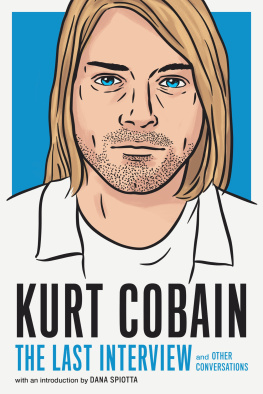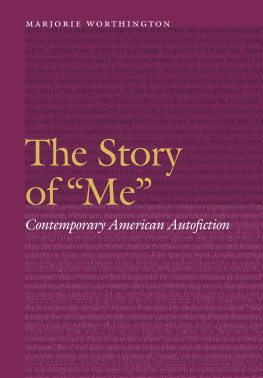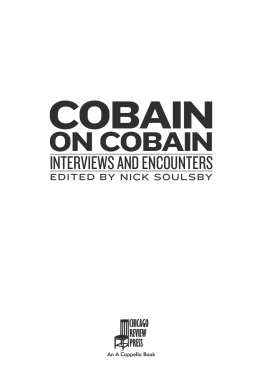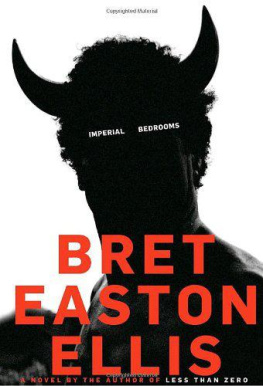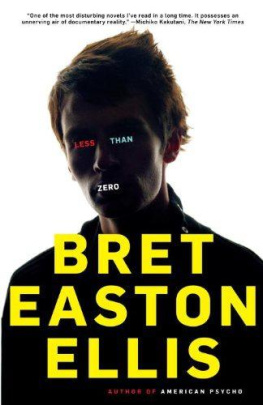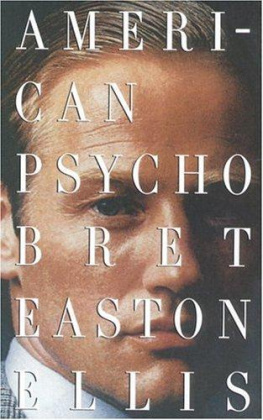Smothered in Hugs
Essays, Interviews, Feedback, and Obituaries
Dennis Cooper
For
Craig Marks
Jack Bankowsky
Andrew Hultkrans
Tom Christie
Judith Lewis
Joy Press
M. Mark
Contents
The World Wrestling Federation
Derek Jarman
Gary Indianas Gone Tomorrow
R.I.P. River Phoenix
Courtney Love
R.I.P. Kurt Cobain
The Violet Quill Reader
Bob Mould
The Sonic Youth Liner Notes
Quentin Tarantino
Words from the Front
Ryu Murakami
R.I.P. Bob Flanagan
Stephen Malkmus
Irvine Welshs Ecstasy
The Many Lives of Experimental Fiction
The Leonardo DiCaprio Interview
How Gordon Lish Became Gordon Lish
Rainer Werner Fassbinder
(cowritten with Joel Westendorf)
Six Young Artists
R.I.P. William Burroughs
The Christian Bale Interview (cowritten with Joel Westendorf)
The Brad Renfro Interview
The Biography
David Wojnarowicz
Mary Harrons American Psycho
Robert Bresson
Denis Johnsons Name of the World
Lars von Triers Dancer in the Dark
Henry Darger in the Realms of the Unreal
A Conversation with Clive Barker
The Punk Photography of Jim Jocoy
Bill Henson
The Brion Gysin Reader
Mike Kelley Talks to Dennis Cooper
Ondi Timoners DiG!
I published my first piece of nonfiction when I was about a year out of high school, meaning in 1972 more or less. A friend of minewho liked my poems and short stories and who thought I talked intelligently about musicknew an editor of a small Pasadena, California, newspaper, whose moniker Ive since forgotten, and somehow she talked this higher-up into naming me, an inexperienced Rimbaud wannabe who thought every linear sentence was a lie, as the papers official music critic. My initial assignment was to critique Leonard Cohens then brand-new Songs of Love and Hate album, and while I thought I had plenty to say, I found putting my thoughts into prose completely torturous. One, I had almost no chops as a stylist, and, two, I seem to suffer from a lifelong disconnect between my very opinionated side and the side of me that seems to need to write stuff down. I was so embarrassed by the review I turned in that I never even cracked that issue of the newspaper. After I similarly botched a second task to review a Neil Young concert, the editor canned me.
The next time I braved a nonfiction assignment was about ten years later, also at the behest of a small Pasadena newspaper, in this case a short-lived alternative free monthly called Gosh! They offered me a regular column in which I could write about virtually anything I wanted, and that freedom made the opportunity feel more alluring and safe enough. What I wrote for Gosh! and for other publications ( Advocate , LA Reader , New York Native , Art in America , a.o. ) over the next few years was not as absolutely terrible as my initial forays had been, but youll notice that nothing from that era has survived the cut. Honestly, I still think nonfiction and my particular writing ability do not make a natural couple. And every time I take on a journalistic gig to this very day, it feels as though Ive embarked on a difficult formal experiment as much as set out to make a valid case about something or someone. Im guessing that if the pieces in this book have a value outside of the inherent charisma of their subjects, its probably due to some effect caused by my writings struggle to fulfill the formal requirements of the assignments I was given.
Otherwise, I just want to say that in the early 1980s, the critic and poet Peter Schjeldahl told me I had a sensibility that might make me a good critic, and without his encouragement and support, Im not sure any of the pieces in this book would have existed. Also, I feel like I should note that my opinions have changed since I wrote certain of these articles and reviews. I now think Samuel Delaneys Hogg is a great novel, and I dont know why I didnt realize that upon first reading. When The Violet Quill Reader was published, I felt it was part of an attempt to create a kind of hierarchy within so-called gay literature whereby the writers in that group were to be seen as the high standard, and I think in my great dislike of this proposal, I was too harsh on the work of the writers in the volume. Lastly, while I stand by my low opinion of Brion Gysins writings, I wish I had made a stronger case for the brilliance and quality of his visual art.
Dennis Cooper
2010
(March 1985)
Punk has always had a contingent of lesbian and gay bands, critics, fans, and general scene-makers. Out of fear of skinheads and the like, they remained a relatively silent subminority until the rise of Reaganism, then AIDS, and the gradual realization that silence under the circumstances meant, well, death. Bolstered by the popularity of bands like the Smiths and Bronski Beat, as well as by the support of cool, straight upstarts like Jello Biafra, Lydia Lunch, and Henry Rollins, these punks began to think out loud, meet, organize. Trouble was, the gay community at large, giddied and a little spooked by its growing political power, seemed to meet calls for anarchy with a collective finger to the lips. To punks horror, many gays in the early 80s had gotten as lazy as the heterosexual mainstream who sought to oppress them. Problem children (punks, activists, women in general) were marginalized via an unspoken but entrenched class structure that effectively alienated all but the most privileged.
Homocore is pretty much a direct result of that schism. The term was coined a few years back by Bruce LaBruce and G. B. Jones, the editors of Torontos seminal lesbian/gay punk minimagazine (or zine), J.D.s , and later adopted by the San Francisco zine Homocore . There are about twenty Xeroxed and/or cheaply offset-printed publications like them across North America, constituting a network of sub-desktop alternatives to established, large-circulation periodicals like the Advocate and Outlook . Mutually supportive for the most part, but individualistic in outlook and design, these zines share a hatred for political correctness, yuppification, and all things bourgeois, especially within gay culture. In fact, for many of these young editors, the enemy is less heterosexuals than, in the words of Johnny Noxzema of Bimbox , cryptofascist clones and dykestelling us how and what to think. Or as Tom Jennings describes his zine Homocore , One thing everyone in here has in common is that were all social mutants ; weve outgrown or never were part of any of the socially acceptable categories. You dont have to be gayany personal decision that makes you an outcast is enough.
Homocore (c/o World Power Systems, P.O. Box 77731, San Francisco, California 94107; $1, cash only) is the most generous and info-packed of the zines. Produced on the kind of cheap newsprint that seems to yellow before your eyes, it consists of letters from readers, reports on anarchist goings-on, pics of partying local scenesters, and lots of opinions from Tom Jennings and assistant Deke Nihilson. Though hed probably deny it, Jenningss motormouthed editorializing makes him the unofficial conscience of the movement, and his pronouncements, even when couched in who-the-fuck-am-I-to-say-ism, give this zine the hyper-earnest tone of classic punk periodicals like Flipside and Maximumrocknroll . In a recent issue he seems to speak for all when he bemoans the scarcity of lesbian-edited zines, and declares himself pro-drugs (or certain drugs anywayLSD, mushrooms, cocaine). But occasionally he distinguishes Homocore from the pack by taking a rather old-school liberationist stance, as in his recent dismissal of one of the more self-consciously abject gay zines, Carnifex Network , whose provocatively unopinionated debate on the pros and cons of intentionally spreading sexual diseases brought out the traditionalist beneath the mohawk. If you hate yourself, he responded, and wanna indulge that, fine, but I am not gonna support it. The world-at-large does enough of this for us, thank you, without us doing it to ourselves.


